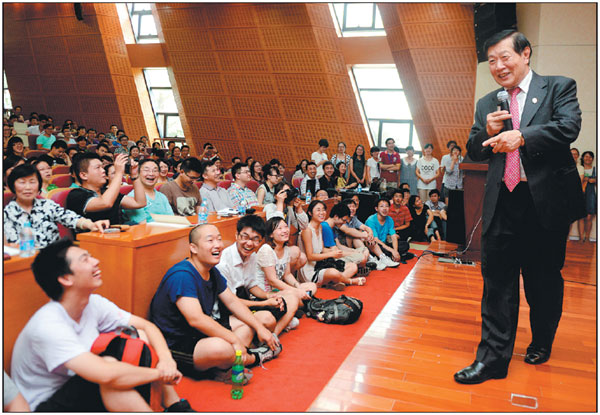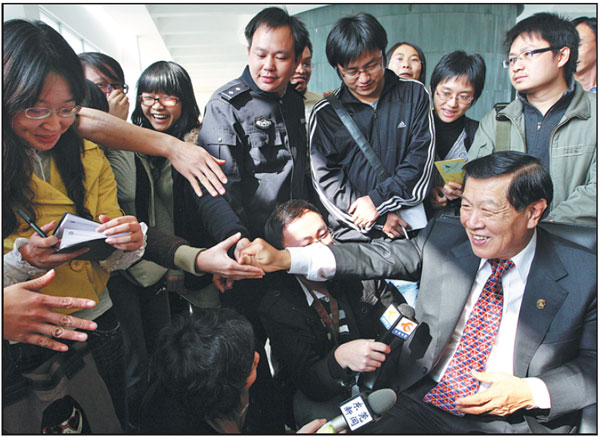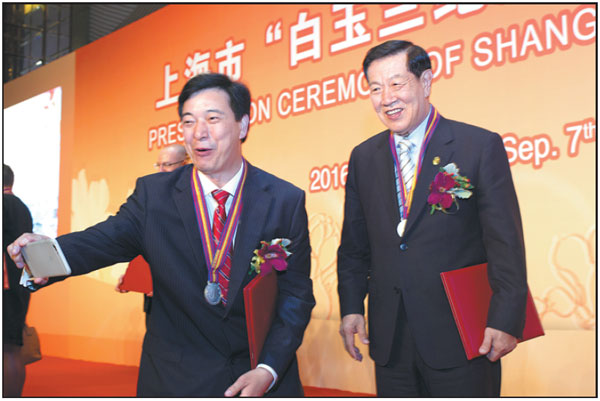Top forensic scientist finds evidence of great progress
Editor's note: This year marks the 40th anniversary of the launch of China's reform and opening-up policy. China Daily profiles people who experienced or witnessed the important drive.
Henry Chang-yu Lee say China has become a leading player in high-tech systems for catching criminals
Globally renowned forensic scientist Henry Chang-yu Lee has tipped China to become a world leader in high-tech evidence collection thanks to growing investment in time, energy and talent since the 1980s.
"I believe the technology in China will be more advanced than even in the United States within five years," the Chinese-American expert said in an exclusive interview.
|
Henry Chang-yu Lee gives a speech at Shanghai Jiao Tong University on July 26, 2013. Du Xin / China Daily |
|
Lee talks with local media in Dongguan, Guangdong province, after a public speech on Dec 3, 2009. Chen Fan / For China Daily |
|
An award winner tries to pose with Lee after the 2016 Shanghai Magnolia Award ceremony, on Sept 7, 2016. Lee was one of 50 foreign winners of the award. Gao Erqiang / China Daily |
Lee, 80, has more than five decades of experience in forensic science and has taken part in investigations into some of the biggest criminal cases in the United States. Since the 1980s, he has regularly traveled to China to offer his expertise to students, law enforcement, lawyers and judges.
"The apparatus and devices used to identify fingerprints or footprints, for example, were very simple when I first visited Chinese forensic laboratories," he said. Yet as forensic science has developed in the country, he said there have been many advances, particularly in electronic evidence collection and real-time monitoring at banks to prevent fraud.
In 2016, Lee and several other experts established the Silk Road Forensic Consortium in Xi'an, Shaanxi province, to fight crime and safeguard security by boosting scientific exchanges among countries involved in the Belt and Road Initiative.
The consortium, which has 150 members from 30 countries and regions, provides an open platform for forensic specialists, police officers and judges to share ideas and difficulties as well as experiences in DNA identification studies.
Lee, who acts as chairman, said, "Although we speak different languages in our daily lives, we all speak the same 'language' at work, and that's the language of criminal investigation. We share the same goal - to speak for the dead using forensic science."
In September, at the organization's third annual conference in Yantai, Shandong province, Lee announced plans to unify DNA identification standards among its members to try and build a mutual DNA database that can better solve criminal cases.
Unified standards are essential to the world of forensic science, he told China Daily. For example, he said, forensic technicians in different Chinese cities use various chemical reagents, apparatus and reports to identify DNA, which could affect cross-regional cases.
"If we can achieve unification in China, it can be extended across Asia, to the consortium and finally the world," he added. "It would mean a brighter future for forensic science."
Preserving cultures
Lee was born in Rugao, Jiangsu province, and was a child when his family moved to Taiwan. He took an interest in law enforcement from a young age and graduated from the island's Central Police College in 1959.
For five years he was an officer with the Taipei Police Department, eventually rising to the rank of captain, before he and his wife, Margaret, emigrated to the US.
After witnessing violent police interrogations and even the torture of criminal suspects in Taiwan, Lee said he felt such tactics were cruel and ineffective, as they weaken the credibility of evidence and confessions.
Instead, he decided to study forensic science. While paying his way working part-time jobs, including as a waiter and lab technician, between 1972 and 1975, Lee obtained a bachelor's degree from City University of New York, and a master's and PhD in biochemistry from New York University. He went on to teach at the University of New Haven, Connecticut.
In 1985, while director of the Connecticut State Police Forensic Laboratory, Lee was invited by China's ministries of public security and education to lead a monthlong training course for police officers, legal professionals and lab technicians at Renmin University of China.
The trip was his first time back to the Chinese mainland and marked the start of decades of exchanges between Lee and scientists and criminal investigators nationwide.
"After an increase in child kidnappings in the '90s, I returned to my homeland again. I introduced how to use DNA and advanced chemical reagents to identify suspects and solve such cases," he said.
It was also around this time that Lee became commissioner of the Connecticut Department of Public Safety, making him the first Chinese-American to lead a state-level police authority in the US. He held the post until his retirement in 2000.
Over the past 18 years, Lee has continued to consult on criminal cases around the world, as well as direct the Henry C. Lee Institute of Forensic Science at the University of New Haven, Connecticut.
He returns to China seven to eight times a year to deliver lectures, sometimes to students at college or high school. "I want to educate them to be good people," he said. "I tell them not to always be looking at their smartphones, to go see the world."
Reflecting on his early years in the US, he said he faced discrimination in his field. "American people sometimes looked down on me for my foreign background. But I didn't give up. I was determined to prove myself."
He went on to become a leading authority, working on high-profile cases such as the O.J. Simpson murder trial, a reinvestigation into the assassination of US president John F. Kennedy, and the hunt for the Washington sniper.
Lee said the reform and opening-up policy introduced by China in 1978 led to rapid economic and societal developments, allowing many Chinese to study or live abroad.
"A good thing is that more Chinese are going out to further study forensic science. They will come back to use that knowledge to serve their country," he said.
"I'm happy to see more Chinese now working with Americans in forensic labs, but I always advise them to be leaders in the workplace. We should break Western stereotypes by showing our abilities and leadership."
He also suggested overseas Chinese should be diligent and cohesive, to uphold their national dignity and preserve their traditional cultures.
"Only in this way will we speak louder to the world," he said.
caoyin@chinadaily.com.cn
Q&A
What were your impressions of China when you returned for the first time in 1985?
When I was invited by the Ministry of Public Security and Ministry of Education to provide training for judicial workers, it was my first trip back after many years of living and studying overseas. Beijing had changed a lot, although the change could not be compared with nowadays. I still remember many foreigners stayed at the Beijing Friendship Hotel, which at that time was the city's only large hotel.
What are the biggest changes you have witnessed over the years?
Since the launch of reform and opening-up, China has developed in many aspects. The country has more cities, more job opportunities, and it has become more civilized and brought fast development to the global economy. As for my industry, I'm happy to see the growing number of Chinese willing to work in forensic science, and I'm glad to see that the country's forensic devices and capability, such as those for identifying fingerprints, have become more powerful.
How do you view China's efforts during the past four decades of reform and opening-up? And what role have you played?
Take forensic science for example. More students, teachers and employees engaged in or working in science-related industries have gone overseas to learn more advanced knowledge and receive forensic training. Thousands of Chinese have also come to me to listen to my speeches - and these people have made great contributions to the industry in China. What I have done is share my experience, provide education and offer advice in criminal investigations.
What would be your advice to China on further reform and opening-up?
What is important for China during its fast development is to uphold the country's traditions and cultures, such as respecting elders and taking care of your family, and passing these traditions on. As the world becomes more prosperous, Chinese shouldn't blindly focus on catching up with Western countries and forget what we already have.
What does an open China mean for the world?
The world has become a big family since we entered the 21st century. I don't want to see us argue or fight over economic gaps, and I don't want the world to move away from peace and openness. Openness improves our lives and beautifies the world. An open China means to be friendly to others as well as to join hands in the face of challenges or difficulties caused by disease or threats to the environment, security and the economy.




